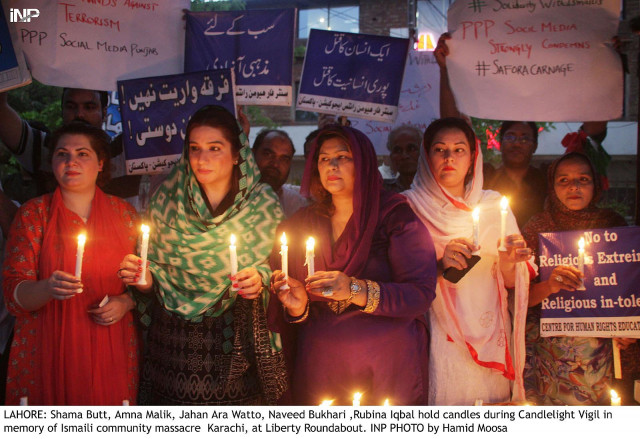Protesting terrorism: ‘Don’t point fingers at foreign hand, arrest culprits’
Civil society members protest against attack on Ismaili community in Karachi.

People hold candles during a candlelight bigil in memory of the victims of the Karachi massacre at Liberty Roundabaout. PHOTO: INP
Scores of civil society members and citizens gathered at Liberty Roundabout on Thursday to protest against the gruesome attack on the Ismaili community in Karachi on Wednesday.
“We have gathered here to express anger and grief at the incident,” Democratic Commission for Human Development director Tanveer Jahan said. The demonstration organised by the Umeed-i-Jawan Network, an alliance of over 80 civil society organisations.
“This is not a one-off incident,” she said. “We listen to tall claims of tackling terrorism, we are told that Zarb-i-Azb has succeeded…yet nothing has changed.”
Umeed-i-Jawan Peace Network general secretary Shazia Shaheen said, “So much is spent on security… yet citizens are butchered in broad daylight like we saw in Karachi.”
Nighat Saeed Khan of the ASR Resource Centre said the immediate cause of concern was the lack of preparedness to tackle such situations. “The state has not been able to get to the bottom of this. There are several powers at play in these incidents.”
Rano Usman said, “I’m only a concerned citizen who feels that we need to condemn terrorism and genocide of minorities in the country.” She said it was the government’s responsibility to protect the citizens.

Umeed-i-Jawan Peace Network is an alliance of over 80 organisations from across the Punjab. The protesters held a candle vigil for those who died in the attack at Safoora Chowk. Abdullah Malik, president of the network, said the government must follow its National Action Plan in letter and spirit. “We want justice for the lives lost in incidents of terrorism.”
He said a reason why such culprits were not arrested was that the police was politicised. He said if the government banned carrying weapons for a year, it would mitigate the problem significantly.
Imtiaz Alam, president of the South Asian Free Media Association, said the attack had occurred because sectarianism had been allowed to entrench in the society. He said sectarianism had been spread through hate-literature, a skewed education policy and political parties divided along religio-political lines. “Let’s talk about ending this instead of pointing fingers at some foreign hand.”
These attackers came from Pakistan. This is the issue at hand, he said.
“The Muslim world has suffered at the hands of hardliners and fundamentalists all over the world. Look at what’s happening in the Middle East… these are problems we have created.”
Jahan Ara Wattoo, a member of the Pakistan People’s Party, said she was representing her party.
“We need to worry about the fact that Muslims are no longer safe from one another.” She also stressed the need to ensure security to minorities in the country.
Justice now
The Centre for Human Rights Education issued a statement on Thursday, condemning the terror attack.
“We have been demanding a concrete policy to counter religious extremism and terrorism…this is not possible without stern action against militant groups and elements which spreading hatred and discrimination on the basis of religion and sect.”
The statement says there can be no hope for peace without complete deweaponisation of the society. This requires strong political will and an effective policy. “A heavy responsibility rests on the shoulders of political stakeholders.”
It calls on the government to revise the curricula taught in educational institutions and remove all material that spread hatred on the basis of religious, sectarian and other lines. Press Release
Lawyers assail Safoora killings
The Lahore High Court Bar Association unanimously passed a resolution on Thursday against Wednesday’s attack on a bus carrying members of the Ismaili Muslim Community.
The resolution also demanded the government quickly nab the perpetrators of the carnage and award them exemplary punishment. Those present on the occasion called on the government to fulfil its constitutional obligation of securing citizens’ lives irrespective of their confession, sect and creed. They demanded the government formulate a strategy to promote national harmony.
Those present said Ismailis were highly educated and law abiding citizens who had played a pivotal role in the economic progress of the nation. They said those responsible for perpetrating the carnage ought to be crushed.
Those present said Karachi had become synonymous with extortion and target killing. They said the enemies of the nation had been striking the jugular vein of the nation under the auspices of an international conspiracy.
Those present said the Safoora incident represented a watershed in the war against terrorism and the government should eliminate terrorists without distinction.
They said lawyers would not allow the enemies of the nation to destabilise Pakistan by stoking the fire of sectarianism.
Those present assailed the growth of intolerance in society saying they would follow Islamic teachings to make Pakistan a peaceful and prosperous society.
Pakistan Bar Council Vice Chairman Azam Nazim Tarar, LHCBA President Pir Masood Chishti, Vice President Irfan Sheikh, Secretary Ahmed Qayyum and Finance Secretary Syed Akhtar Shirazi spoke on the occasion among others.
Partial boycott observed
Lawyers in the city observed a partial boycott of courts during the day on the call of the Punjab Bar Council.
A complete boycott was observed at lower courts while only matters of urgent importance were dealt by lawyers at Lahore High Court.
Black flags were hoisted on bar premises and some lawyers were observed sporting black armbands to express their grief over the carnage.
Published in The Express Tribune, May 15th, 2015.


















COMMENTS
Comments are moderated and generally will be posted if they are on-topic and not abusive.
For more information, please see our Comments FAQ